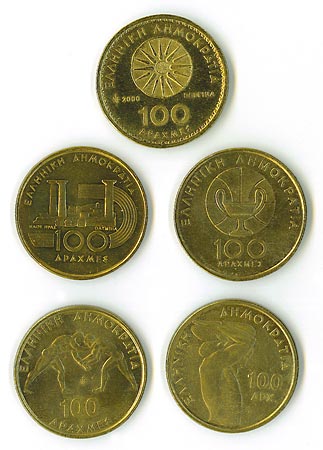Before the European Union officially introduced the euro as currency in 1999 and Greece adopted it in 2001-2002, it had its own currency, called drachma, with a very long history. It had been used by many Greek city-states between the second and the first millennium B.C., including the Classical period; then it was used in the Hellenistic period and finally under Roman domination. Greece obtained its independence in 1830 from the Ottoman Empire, and two years later, the drachma was restored as the official currency.
The drachma was also a weight unit, first equivalent to 66.5 grains, and then approximately to one gram. It is likely that this quantity was first used as monetary unit before metals were adopted; the word δραχμή (drakhmḗ) was derived from δράσσομαι (drássomai, “to grasp, seize”) and originally may have meant “fistful.”
The Greek word was loaned by the Iranian languages, and thus we have words like Persiandiram, Pahlavi dram (“a small weight; money”) , and Kurdish diraw (“money”). On its way, it lost the middle sound kh (an aspirated h) and the final e. And yes, we also have Armenian դրամ (Classical/Eastern Armenian dram; Western Armenian tram), which most probably came from Middle Persian or, otherwise, had a similar bumpy road of lost sounds from Greek drakhmḗ. In any case, the word was already mentioned in the Armenian translation of the Bible (before the first half of the fifth century A.D.).
The word dram was already used as a monetary unit during the time of the Armenian kingdom of Cilicia, particularly in the 13th and 14th centuries, and the second republic of Armenia adopted the dram as the name of its own currency in November 1993.
However, you should not be confused in the streets of Yerevan: although Modern Armenian uses the word dram in both Western and Eastern Armenian, for instance for the word tghtatram(թղթադրամ “banknote”), in Eastern Armenian the word pogh (փող) is used in colloquial language with the meaning of “money.” This word, which was also utilized in Cilician times as a monetary unit, comes from Persian pul (“small coin”).

